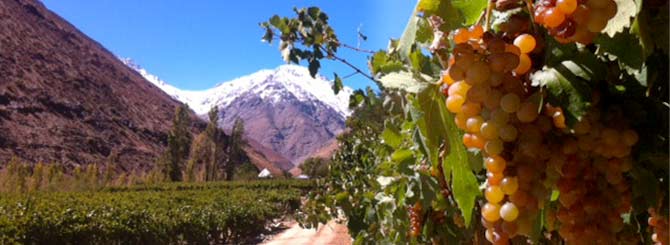Chile’s new wave of natural wine

‘Natural wine’ might be a relatively over-talked subject in the wine circles of London, Paris and New York, but in the distant stretches of Chile the discussion is only just starting – or arguably never stopped. The growing undercurrent of natural wine production is further proof that this skinny country is not just screw top […]
Women in Wine: Argentina

Twenty years ago, it was hard-won to find a female working in the wine industry in Argentina, let alone a female winemaker. But today women are taking their place in the sector and this year’s Argentina Wine Awards boasted an all-female tasting panel, bringing to light the role that many of the fairer sex now […]
South Africa Vintage Report 2015

Some claim it is one of South Africa’s best vintages for decades, but that doesn’t mean it was without drama. Written for Wine-Searcher So, how was the 2015 harvest in South Africa? “Like a rat up a drainpipe being pursued by a Cape cobra,” was the analysis of Fledge & Company’s Leon Coetzee. “It was […]
Argentina Vintage Report 2015

It’s been a tricky harvest for much of Argentina, with yet another warm and wet vintage that will separate the good winemakers from the inexperienced. Written for Wine-Searcher Argentina received the tail-end of Chile’s odd climatic year. In the south, the Patagonian region of Chubut had to pick earlier than planned in order to avoid […]
Chile Vintage Report 2015

Chile has had a pretty wild ride this year, marked by floods and volcanic eruptions. The resulting wines will be mixed but the warm season looks promising for Mediterranean varieties. Starting in the north of the country, a hot and very dry growing season pushed harvest times forward by a couple weeks. “We have had […]
The social impact of Fairtrade

After a week at Bosman Family Vineyards, I had the chance to really see some of the social impacts that Fairtrade money can have on a community. Check out these videos to see how your Fairtrade premium helps improve the lives of the very youngest in the community: [youtube https://www.youtube.com/watch?v=LPZY4eHd1yY&w=560&h=315] [youtube https://www.youtube.com/watch?v=E76A5oftCwk&w=560&h=315]
A Fairtrade adventure in South Africa

I’m heading to South Africa next week to learn a bit about Fairtrade in wine production and how it is impacting the workers and communities near Bosman Family Vineyards, one of The Co-Operative’s leading Fairtrade producers in the New World. Here’s the video for a sneak preview of what I’m looking forward to doing… [youtube […]
10 Argentine Winemaker’s to Watch

Written for the Drinks Business, February 2015 View PDF Argentina has long been known for its lush, ripe Malbec, and there’s no doubt that those wines are still in full swing. However there is a tide of change in the style of not just Malbec, and the new generation of winemakers are at the helm […]
Interview with Robert Kamen, Kamen Estate

Interview for Wine-Searcher You grew up in the city projects in the Bronx. How did you end up as a California winemaker? I sold my first screenplay to Warner for $135,000 in 1979. I called my friend to celebrate and came down to Sonoma to meet him. We bought some wine, rolled some joints and […]
Five Argentine wines to charm your Valentine’s

This weekend is February 14th. A date which men see as another date in another month, and most women see as the date of the month. Score some extra points this Valentine’s Day by gifting your lady a beautiful bottle of Argentine wine. Here are five for five very different type of women. Written for […]

